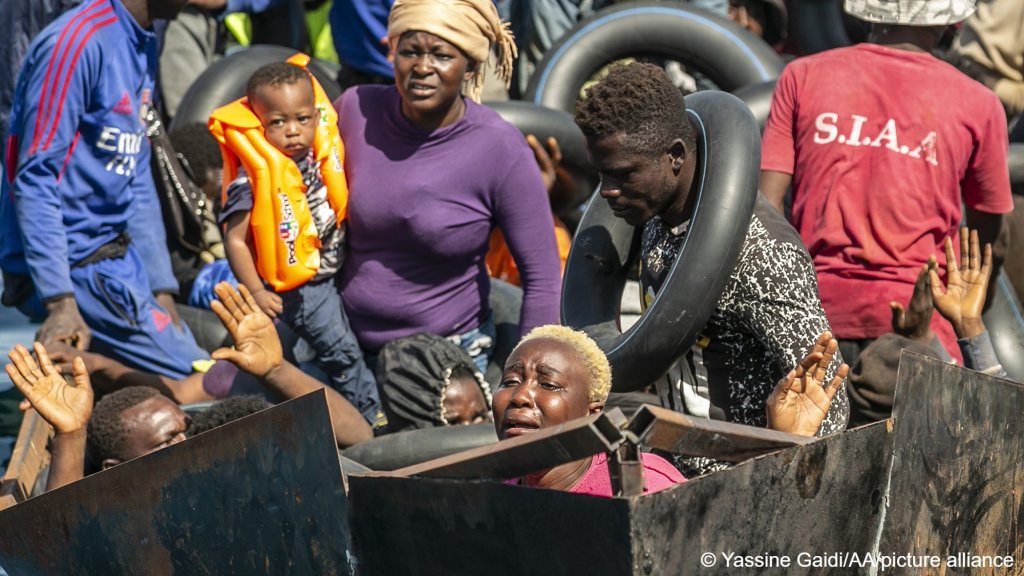The Tunisian coast guard has a new method when intercepting migrants at sea: confiscating boats and forcing passengers to swim to shore. Ibrahim witnessed it first hand when he tried to cross the Mediterranean.
"Last week, I tried to reach the Italian coast by sea. With about forty people, including women and children, we left the olive groves around 10 p.m. to reach the beach, which is about four kilometers away from our camp.
Thousands of migrants were driven out of the city center of Sfax (central-eastern Tunisia) last year and settled a few kilometers away, in the olive groves near El-Amra. Huge camps, made of plastic shelters, were set up along the road. Living conditions there are very precarious, people face violence and poor health conditions.
We had to walk for two hours, in the middle of the night, and carry the equipment necessary for the crossing ourselves: the engine, the canoe, the inner tubes [when crossing the Mediterranean, some migrants carry inner tubes so as not to sink in the event of an accident, editor's note] and the jerry cans of gasoline.

Before, smugglers took care of that. But they no longer go to the water's edge because they fear being arrested by the police during the launch [the term used by migrants to designate the launching of the boat into the water, editor's note]. So they drop the boat off a few days before in the camp and it's up to the migrants to bring it to the beach.
A group of seven people, armed with machetes, escorted us to the sea. Often, migrants are assaulted on the road by other Sub-Saharans who steal their boat, for their own crossing or to resell it. So, it's better to be 'protected' in case of attacks. The escort is made up of friends, people you trust.
Read AlsoEU asks Tunisia to investigate migrant abuse claims
'A lot of people were crying'
Around half past midnight, we set sail. But after two hours of driving, coast guards came towards us, on two jet skis. They circled our boat to make waves. Then, they asked us to turn off the engine and give it to them.
At first, we refused because we know that some coast guards confiscate engines and let migrants drift for several hours.
The agents assured us that they would tow us to the port. So, after several minutes of discussion, we agreed to give them the engine and the cans of gasoline. We didn't really have a choice anyway, it was either that or they would continue to make waves, and we could fall into the water.
A navy boat arrived. He pulled our boat towards the shore. Suddenly, the coast guard stopped at sea and told us to get out of the boat. We could see the shore in the distance. The water was not deep, it came up to my belly.
They forced us to swim. Some migrants did not know how to swim.
Everyone was afraid. Many people were crying. The women said they could not go into the sea, at night, with their children on their backs.
But, once again, we had no choice. And then, we said to ourselves: it is still better than being sent to the desert.
Since last summer, migrants have been stopped by Tunisian authorities in the street, in shops, in their apartments or at their place of work and are deported into the desert, near the border with Algeria or Libya. They are abandoned in the middle of nowhere, without help. Women and children are not spared.
When people are intercepted at sea, they are also systematically deported, often to desert regions, as an official confirmed to InfoMigrants in April on condition of anonymity.
Read AlsoTunisia: Migrants remain missing after alleged abandonment in desert
'The behavior of the Tunisian coast guard is increasingly violent'
The men got off first, and we helped the women. The Tunisians left with the boat, leaving us there on our own.
For two hours, we walked in the water to the coast. We split into two groups and we all held hands.
In some places, the water was deep. We could no longer stand. Those who could swim helped the others. Luckily we had inner tubes as life jackets.
We all arrived safely on the beach. Day was breaking. We had to walk four kilometers again to reach our camp, under the olive trees. We were soaked...
The behavior of the Tunisian coast guards is increasingly violent: they were already tearing out the engines, making waves, but now they are also throwing tear gas grenades on the beaches at the time of departure... and abandoning people in the water. This is the first time, in three attempts, that I have seen this."
*Ibrahim’s first name was changed to protect his anonymity.
